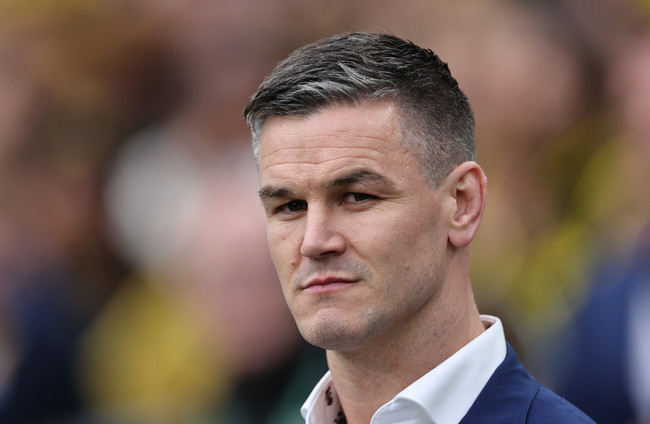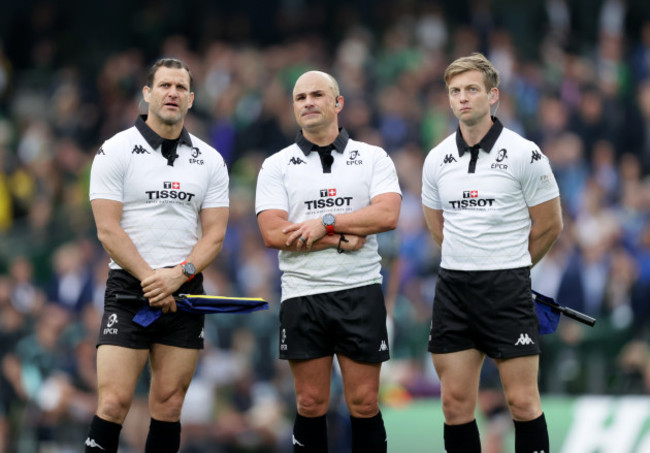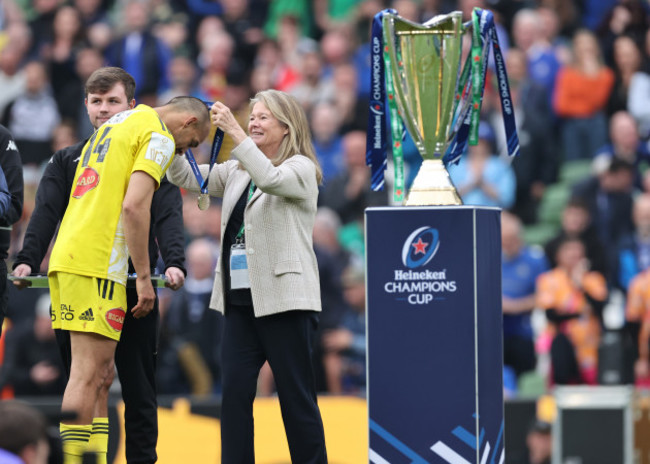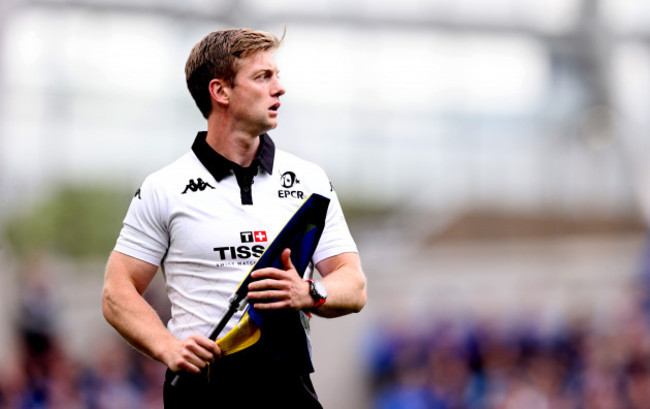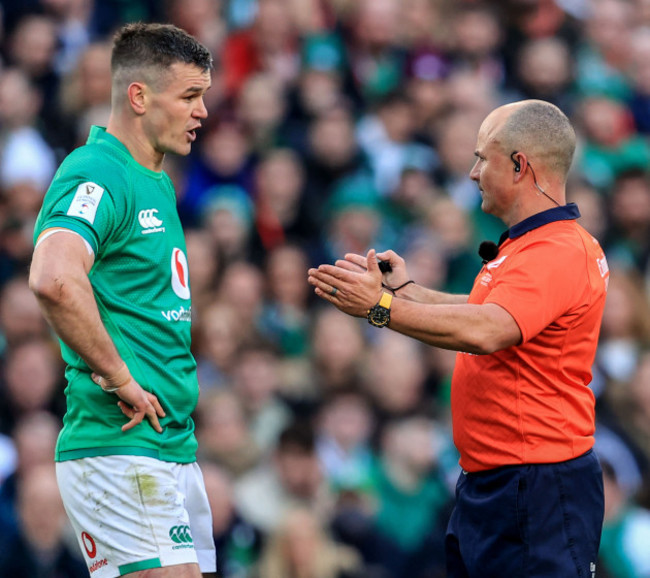THE COMPLEXITY OF the Johnny Sexton case was highlighted by the fact that the written report from the independent disciplinary committee ran to 36 pages.
Even accounting for a misconduct complaint against Leinster Rugby also being involved, this is an extremely long document.
In the end, Sexton was banned for three games and will be available for Ireland’s World Cup campaign, his swan song before retiring from professional rugby. The suspension will surely have come as a major relief to Sexton and Ireland given the fears about his involvement in the tournament.
So what was actually involved in the lengthy hearing that resulted in Sexton being suspended for confrontational and aggressive behaviour towards the match officials after the Champions Cup final between Leinster and La Rochelle in May?
EPCR made the misconduct complaint against Sexton based on three incidents. This is what was alleged:
- Incident 1: Shortly after the final whistle, Sexton – who had not played in the game due to injury – approached the match officials and “gestured towards them and/or spoke to them inappropriately.”
- Incident 2: At the start of the medals presentation, Sexton stood behind the match officials, looking at them and directed “further inappropriate comments at them.”
- Incident 3: After the medals presentation, Sexton approached the match officials and “followed them a short distance as they left the field.”
Following the hearing conducted via video conference, the independent disciplinary committee ruled that Sexton was guilty of misconduct due to his behaviour in Incident 1 and Incident 2. However, they decided there was no misconduct involved in Incident 3.
Let’s work through the incidents and highlight some of the evidence that was considered.
Several of the submissions mentioned here were made before the hearing itself took place last week, while other comments were made during the hearing, and this piece attempts to summarise all of that as concisely as possible. The full written report can be read here.
Incident 1
Readers may have seen the video footage of Incident 1 that circulated in the media soon after the game. The independent committee had access to a range of angles for all incidents, meaning they could closely study Sexton’s movements and actions.
In this instance, Sexton was seen walking onto the pitch in the direction of some of his Leinster team-mates, spotting the match officials to his left as they spoke to an EPCR employee, twice pointing his left hand, jabbing a finger/fingers at them, walking past them but then changing direction and moving back towards the officials.
Assistant referee Karl Dickson stepped towards Sexton, who stopped around two metres away and said something to Dickson and/or referee Jaco Peyper and assistant referee Christophe Ridley. Sexton then walked away, having jabbed his finger at them again, to join his Leinster team-mates nearby.
In their submissions, Peyper, Dickson, and Ridley all stated they couldn’t hear what Sexton said during this incident due to the noise in the Aviva Stadium. But they were in agreement that Sexton had been hostile towards them.
“It was clear from his increasing proximity and aggressive demeanour that he wished to confront us and did so intentionally,” said Peyper.
Dickson said he spotted Sexton “gesturing from afar and approaching us,” recognising that he needed to intervene. Dickson couldn’t exactly recall what he said to Sexton as he motioned him away but believes it might have been, “Not now.” Ridley also saw Sexton “pointing at us and speaking with frustration” before Dickson dissuaded him from coming any closer.
So what did Sexton say? The only evidence in this regard was from Sexton himself.
Sexton couldn’t recall his exact words but admitted that it was something along the lines of, “It’s a disgrace you guys can’t get the big decisions right,” which was probably accompanied by expletives, “most likely the f-word.”
The disciplinary committee added that Sexton “clearly said more than just the words he admits.”
The written report reveals that after Peyper and Dickson spoke during the hearing, Michael Cush – Sexton and Leinster’s legal representative – made it clear to both of them that Sexton accepted his conduct in Incident 1 was “completely unacceptable” for which he “apologised unreservedly.”
In ruling on Incident 1, the committee said Sexton’s “words and actions were confrontational, aggressive and disrespectful of the match officials.”
They added that his conduct was “obviously unsportsmanlike and brought the sport of rugby union into disrepute.”
Sexton himself admitted his actions in Incident 1 amounted to misconduct “in a moment of unique and exceptional emotional intensity.”
And so, the committee found that Sexton had committed misconduct in Incident 1.
Incident 2
EPCR alleged that just before the medals presentation Sexton followed the match officials, took up a position where they would be aware of his presence, stared at them in an intimidating manner, then shouted an obscenity at or heckled them while they received their medals.
Again, the committee used multi-angle video footage to assess this incident. They said it showed Sexton walking to join Leinster players and coaches near the 22-metre line. Sexton’s young son was with him. The match officials were gathered close by.
While Sexton denied that he followed the match officials and said he was simply joining a Leinster group in an area designated to them, the match officials felt otherwise.
Peyper said he “became aware that Johnny Sexton had followed us across the field and taken up a position a few metres behind us and to our left.” The South African referee added that once they realised Sexton “was staring at us, we turned our backs to try and avoid any further confrontation with him.”
Dickson also said Sexton “followed us across the field” and that the officials “avoided making eye contact with him to try and discourage him from approaching us again,” while Ridley felt Sexton “came toward the same part of the field” as them.
However, having reviewed the footage and heard Sexton’s account, the committee was “not satisfied that he followed the match officials in the sense that he pursued them.”
The committee said the video footage shows that Sexton did spend some time staring at the match officials, with the committee dubbing his demeanour as “brooding.”
Television match official Tom Foley had joined Peyper, Dickson, and Ridley for the medals presentation and in his statement, said Sexton “shook his head and muttered every time eye contact was established” with the match officials. However, upon Cush raising the question, Foley agreed that the available footage did not show Sexton shaking his head during Incident 2. Still, Foley “was adamant that he saw such head shaking at some point.”
As the officials walked to collect their medals, Sexton “clearly mouthed something” at them, according to the committee. They were satisfied that the match officials didn’t actually hear Sexton, with none of them stating that they did.
Having viewed close-up footage, Sexton accepted that it looked like he said “f-ing” in this instance but said he “does not recall the words he spoke.”
In rejecting the notion he had committed misconduct in Incident 2, Sexton denied that he was speaking to the match officials, never intended for his words to be heard by them, and was instead “venting” to himself. Sexton said his words were a “verbal expression to himself of the acute disappointment he was feeling at the time.”
However, the committee said they “have no doubt” that Sexton was speaking about the match officials and that they were confident what Sexton said was “not complimentary and included something (at least) disrespectful about them and/or the referee and/or their or his performance.”
In ruling on Incident 2, the committee said Sexton’s conduct was “a continuation of his hostile animus towards the match officials,” adding that Sexton “was still publicly venting his anger towards them and had yet to regain his composure.”
Sexton’s conduct was “unsportsmanlike” and aggravated Incident 1, according to the committee.
Incident 3
This is the incident in which the committee ruled that Sexton was not guilty of misconduct. As with Incident 2, Sexton did not accept that his actions in Incident 3 amounted to misconduct.
EPCR’s case alleged that Sexton tracked the officials and attempted to engage with them in a way that was “intimidating or provocative.”
As per their statements, the match officials felt Sexton “started to follow us” [Peyper's words] as they made their way off the pitch following the medals presentation, but Sexton argued he was standing in an area designated for Leinster and noticed the match officials walking past.
Sexton said he “turned towards them to apologise” and drew the attention of Ridley. English match official Ridley’s testimony was important in this incident.
“He approached saying my name and asked me if we could speak, at which point I said sorry but we can’t,” said Ridley. “I would describe the way he approached at this point as measured and not confrontational.”
The disciplinary committee were in agreement that while the match officials “may well have been apprehensive” as Sexton approached again, the Leinster skipper was not lying in wait for them nor was he “seeking to intimate them.”
Sanction
So, the committee decided that Sexton’s actions in Incident 1 and Incident 2 amounted to misconduct as his behaviour was “confrontational, aggressive, and disrespectful of the match officials.”
It was also unsportsmanlike and “brought the sport of rugby union into disrepute.” They then had the task of deciding on a sanction for Sexton.
The committee viewed copies of 23 previous disciplinary decisions said to be of relevance, including reports on Rassie Erasmus’ lengthy ban in 2021, the 10-week suspension against Pau coach Sébestian Piqueronies last year, and Jack Nowell’s fine this year. They admitted “it is sometimes difficult to discern consistency in the assessment of seriousness” in these cases.
The committee underlined the seriousness of Sexton’s offending by highlighting that he was not in Leinster’s match day squad yet still involved himself “unnecessarily” by confronting the match officials.
It was a public display of disrespect and not a fleeting single incident, they said, while also flagging that his actions have a ‘human cost’ for the officials. The committee highlighted Sexton’s public profile, saying his actions and words “have a greater capacity to been seen and so to cause harm.”
In stressing that Sexton’s actions were deliberate, the committee emphasised the fact that he also “had a go” at EPCR’s head of match officials, Tony Spreadbury, after the full-time whistle and before Incident 1.
Asked for a statement for the hearing, Spreadbury said Sexton had shouted at him and that he “would characterise his actions as ‘a spraying’”. This incident was not the subject of a misconduct complaint from EPCR, but the committee used it as “evidence of his state of mind and agitation,” which they said Sexton accepted.
Sexton said he made a “brief” apology to Spreadbury on the pitch before Incident 3, but Spreadbury “could not recall it.” What wasn’t disputed was the fact that Sexton texted Spreadbury the Monday after the game saying he wanted to apologize.
Spreadbury called him and they spoke for a few minutes, with Sexton telling Spreadbury that “the emotion of the occasion had gotten the better of him, and that he regretted his behaviour towards me,” according to Spreadbury, who accepted his apology.
Spreadbury added that Sexton “did not mention the match officials during the call, so I took his apology as being solely to me personally.”
However, the committee accepted Sexton’s submission that his apology for “his conduct on Saturday” was intended to include his actions in Incident 1. They did add that Sexton had not apologised directly to Peyper, Dickson, or Ridley before the hearing and that during the hearing, Sexton’s apology was communicated by Cush.
The apology was used as mitigation, as was Sexton’s remorse, character references, excellent disciplinary record, and early admission of misconduct in Incident 1, including proof of what he said in that instance.
That mitigation was crucial in shaving 50% off what would otherwise have been a six-week suspension for Sexton, and the committee said that “the shortest suspension we can impose is one of three matches.”
The committee stated that this suspension “reflects the totality of his offending.”
Ireland boss Andy Farrell told the committee Sexton would have played in all three of Ireland’s upcoming World Cup warm-up games against Italy, England, and Samoa, while Ireland team doctor Ciaran Cosgrave stated that Sexton was fit to play in them after recovering from a groin injury, so the committee agreed that they were ‘meaningful’ matches.
The ruling means Sexton won’t play be able to play professionally in Ireland again but will be available for the World Cup. “Neither consequence was relevant,” said the committee, underlining that “we imposed a sanction proportionate to his misconduct.”
They said they saw no purpose in adding a fine or making Sexton do a refereeing course. Sexton told them he knows match officials need to be respected and that while he “pushed the line” at times with them on the pitch, he understood that “without them you have no game.”
The committee also felt no need to order Sexton to apologise directly to Peyper, Dickson, and Ridley, given that he told them he would do so during the hearing.
As for Leinster, the committee said the misconduct complaint against them was “parasitic” to the Sexton complaint. So it was no surprise the complaint against Leinster was upheld and they were fined £7,500, suspended until the end of the 2023/24 EPCR season.
Sexton, Leinster Rugby, and EPCR have the right to appeal the committee’s decisions but must register any appeal before 4pm on Wednesday.
